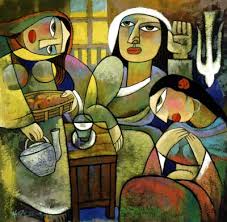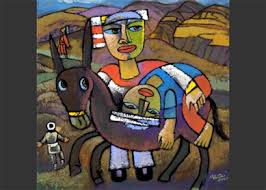
Psalm 95:1-2, 6-9
Ecclesiastes 1:2; 2:21-23
Colossians 3:1-5, 9-11
Luke 12:13-21
July 31, 2016, 18th Sunday in Ordinary Time, 12th Sunday after Pentecost
According to IBON Foundation’s Facts & Figures, there are 23 million Filipinos living in extreme poverty with a salary of only PhP 52.00 or less per day while the bigger portion of the country’s population – the 66 million are earning at least PhP 125.00 or less per day, still below the poverty line. We all know with PhP 125.00 people can only afford to have a kilo of (NFA) rice, few fish (not even a kilo), two packs of Maggi instant noodles, a small pack of instant coffee and a few spoonfuls of sugar. For an ordinary Filipino family, this everyday scenario of “isang-kahig, isang tuka” (hand-to-mouth existence) is very prevalent. And up to now, I am still wondering how this Gospel passage of Luke will be relevant to the Filipino majority.
The Gospel of Luke 12.13-21 is warning us in our desire to acquire abundant possessions. Evidently, the Gospel writer came from a well-off background. He knows investment schemes, banking systems, interest rates and accumulation of wealth. He definitely did not experience the “isang-kahig, isang-tuka” reality. It is easy for him to say “life does not consist only of material possessions” because he might have everything to lead a decent life. I came from a family who lived within or a little above the poverty line. We do not have big properties; we only have the house and the small piece of land where our house is. My father was a tailor as well as my mother. Their income for the day was enough to buy the daily needs and send us nine children to school. No big savings, only enough to spend for emergency hospitalization and unforeseen needs. Most of the time we acquired loans from neighbors and relatives when the expenses went beyond the norm. I remember that one of our dreams was to win the PCSO lottery – so that we can pay for our loans and have a better life. Nowadays, Filipinos are queuing for the different contests and reality shows that offer good opportunities and a sum of money. In their interviews, contestants seem to have a common desire – to bring their family out of poverty, to acquire simple possessions that would let them feel they are indeed human. I think all of us dream to become rich…materially.
The Parable of the Rich Fool is the most condemnatory story in the Scriptures. Luke out rightly said: Fool! The rich man is fool not because he is rich, but because he only used his wealth for personal advantage. If only the materially rich can learn this lesson…If only the remaining 10% of the country’s population be generous enough to give just compensation to labor, abolish contractualization of labor, lessen or remove the value added tax to basic commodities, lower prices, give scholarship grants to poor students, create more jobs so Filipinos would not go to foreign lands to work…if only.
But , then, the poor will not survive and live decently, by the acts of mercy and charity alone. Justice and justice will save them ( Deut 16:20) . The generosity of the super rich would never be enough . If the 10% would provide living wage and stop the contractualization, release the land to the tilling farmers, there would be reform and substantial change .
Once, when I was a student, I was walking along Acacia Road, New Manila, Quezon City. I noticed the big houses with high fences and nice gates. Then I realized that those houses are owned by two kinds of people – the Politicians and the Religious. Everybody knows how politicians are in this country – some are good, others are trying to be good and most are corrupt. It was once a noble profession. I am a member of a religious congregation and I must admit that we own properties, not only in the Philippines but also in other 73 countries. Abundant possessions…yes! But the varied ministries are there, striving to meet the demands of the dynamic Spirit to uplift the lives of the lost, the last, and the least. Yes, acquiring abundant possessions can lead us to foolishness, but it can also lead us to nobility.
“Store up for yourselves treasure in heaven…” This is not for the poor as I mentioned earlier, this is for the materially rich – the politicians, businessmen/women, celebrities, the religious and even the church. We may be rich in the eyes of the poor, but how rich can we be in the eyes of God?
Submitted by:
Sr. Maria Gemma Dinglasan, RGS
Casa Generalizia – Suore del Buon Pastore
Rome, Italy
Photograph from: Rich fool, watchful servant by Nelly Bube
http://pericope.org/buls-notes/images/rich_fool_watchful_servants.jpg


 Psalm 138:1-3, 6-8
Psalm 138:1-3, 6-8 July 17, 2016, 16th Sunday in Ordinary Time, 9th Sunday after Pentecost
July 17, 2016, 16th Sunday in Ordinary Time, 9th Sunday after Pentecost Awit 69:14, 17, 30-31,33-34, 36-37
Awit 69:14, 17, 30-31,33-34, 36-37 7, 16-20
7, 16-20